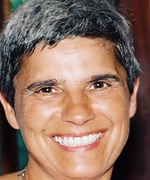Colleagues: Recently Tenured
JEFFREY B. KOPP, M.D., NIDDK
Principal Investigator, Kidney Disease Section, Kidney Diseases Branch

Education: Harvard University, Cambridge, Mass. (B.A. in social studies); University of Pennsylvania School of Medicine, Philadelphia (M.D.)
Training: Residency in Internal Medicine and Nephrology at the University of Washington (Seattle)
Came to NIH: In 1987 as a staff fellow in NIDCR; joined NIDDK in 1995
Selected professional activities: Consulting nephrologist at the NIH CC; a commissioned officer with the U.S. Public Health Service, holding the rank of captain
Outside interests: Hiking; backpacking
Research interests: I lead a translational research group that addresses the kidney disease focal segmental glomerulosclerosis (FSGS), a disease that causes scar tissue to form in the kidneys’ glomeruli. Podocytes are specialized glomerular cells that are implicated in FSGS. Variants in the gene APOL1 are associated with FSGS and related diseases, but only in individuals of African descent. We are determining how APOL1 genetic variation contributes to microvascular kidney disease that usually, but possibly erroneously, is attributed to hypertension; whether APOL1 risk alleles are associated with a shorter renal allograft survival and/or worse renal donor outcomes; and the cellular mechanisms by which APOL1 risk alleles confer susceptibility to glomerular disease.
We are conducting two open-label trials for treatment of FSGS: A single-arm trial examines the efficacy of rituximab combined with cyclosporine (for 48 weeks); a second single-arm trial examines the efficacy of isotretinoin (over 24 to 48 weeks). In addition, we are running a multicenter randomized controlled trial that examines the efficacy of fresolimumab, an antibody that neutralizes transforming growth factor–beta-1, a scarring cytokine. We are also examining the use of cyclophosphamide plus plasma exchange for recurrent FSGS after renal transplant and assessing the role of cardiotrophin-like cytokine 1 as a candidate permeability factor.
EVA MEZEY, M.D., PH.D., NIDCR
Senior Investigator; Chief, Adult Stem Cell Section

Education: Semmelweis University Medical School in Budapest, Hungary (M.D.); Hungarian Academy of Sciences in Budapest (Ph.D. in neuroendocrinology); Hungarian Academy of Sciences in Budapest (D.Sc. in stem cells)
Training: Postdoctoral training at Utrecht University (Utrecht, The Netherlands) and in the Laboratory of Cell Biology, NIMH
Came to NIH: In 1982 for training; left in 1985 to work in the Department of Anatomy, Semmelweis Medical School; returned to NIH in 1987 as a visiting scientist; in 1996 became head of the In Situ Hybridization Facility, NINDS; in 2004 transferred to NIDCR and joined the CSDB as head of the Adult Stem Cell Unit
Selected professional activities: Editor for PLOSOne; editorial board member for Oral Diseases
Outside interests: Spending time with family; reading, watching sports, (especially soccer); walking with her dog; playing Ping-Pong
Research interests: In the first half of my scientific career, I was interested in the hypothalamic regulation of the pituitary and endocrine organs. Later I turned my focus to neuronal regeneration and examined the ability of circulating blood cells to enter the brain and participate in its regeneration in health and disease. I demonstrated the presence of bone marrow–derived neural cells in the central nervous system of mice as well as in humans. In humans, we used post-mortem brain samples of female patients who had previously received bone marrow transplants from male donors, and we used the Y chromosome as the donor-specific marker.
Later I became interested in learning how bone marrow–derived stromal cells (most commonly called mesenchymal stem cells or BMSCs) affect the host immune system. We showed that intravenously injected BMSCs significantly improved the survival of mice with sepsis. Clinical trials have recently been initiated in Canada to test whether human sepsis could also be treated using BMSCs.
We were the first group to suggest that this beneficial effect in mice might be due to reprogramming macrophages from a pro-inflammatory into an anti-inflammatory phenotype producing large amounts of the anti-inflammatory cytokine interleukin-10. We also asked whether BMSCs might be able to rebalance the immune system in an allergic environment. In a ragweed-induced allergy model, BMSCs protect mice from most asthma-specific pathological changes; that is, they inhibit eosinophil infiltration and excess mucus production in the lung, decrease concentrations of certain cytokines in bronchial lavage fluid, and lower serum concentrations of certain immunoglobulins. Our studies suggest that BMSCs respond to the local environment where they are injected.
This page was last updated on Thursday, April 28, 2022
